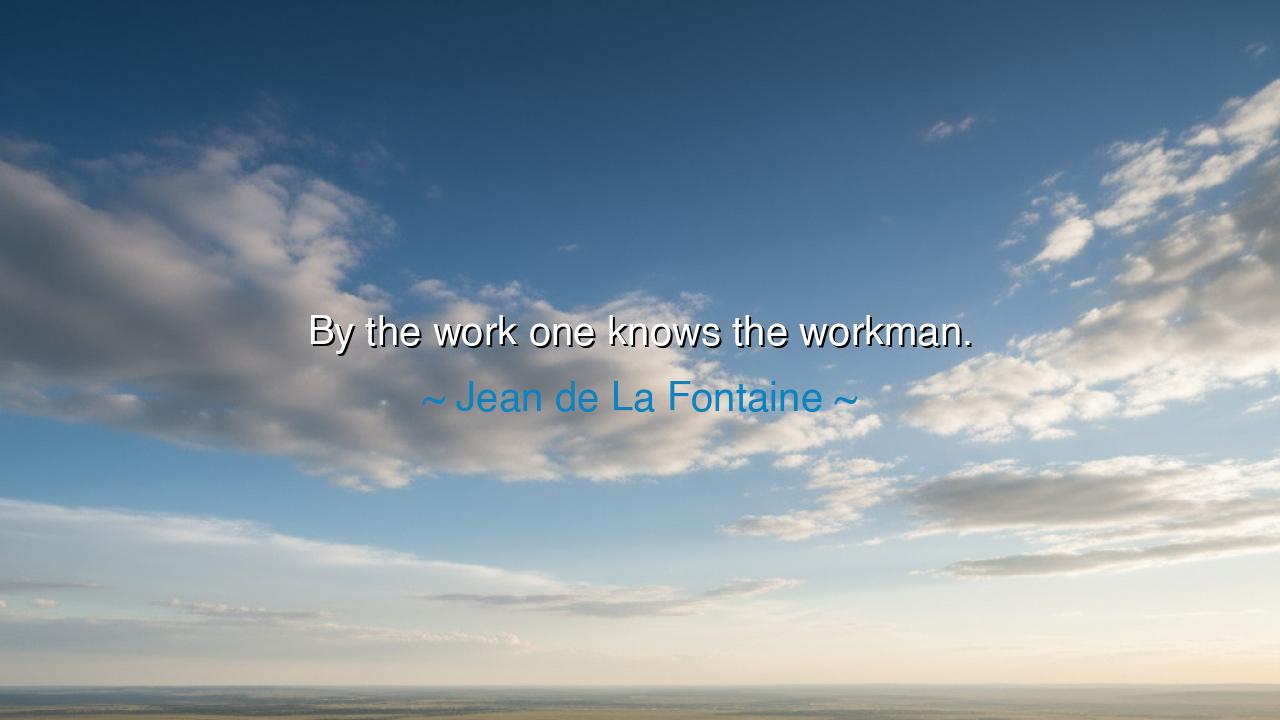
By the work one knows the workman.






Jean de La Fontaine, in his timeless wisdom, declared: “By the work one knows the workman.” These words, simple as the flowing stream, conceal a truth as enduring as the mountains. For what a person fashions with hand, mind, or spirit becomes a mirror of the soul. Deeds reveal character more clearly than proclamations, and the work left behind becomes the living testimony of the workman who shaped it.
In the ancient spirit, we see that kings are not measured by their crowns, nor warriors by their boasts, but by the monuments they raise, the battles they fight, and the justice they uphold. So too, every artisan, farmer, poet, or ruler inscribes their essence upon the world. The plough furrow shows the diligence of the farmer, the carved stone reveals the patience of the mason, and the verse speaks the secret fires of the poet’s heart. Thus the work is not separate from the workman, but the very breath of his being made visible.
This truth stands as both praise and judgment. If the work is noble, so too is the spirit that wrought it; if it is careless or cruel, the stain reflects upon its maker. No mask can long conceal what the hands create, for in every stroke lies the hidden rhythm of the soul. Just as fruit tells of the tree that bore it, so does labor unveil the inner worth of its master.
The origin of this saying lies in La Fontaine’s fables, those wise parables that clothed eternal truths in simple garments. His words were meant not only to instruct but to awaken. He saw that human life is but a brief labor in the great vineyard of time, and that every action — no matter how small — bears witness to who we are. The work outlives the workman, carrying forward his honor or his shame.
Let the generations remember: you are known not by riches, nor by titles, but by the fruit of your labors. Strive, therefore, to let your work shine forth as a beacon of your spirit, so that when you are gone, your deeds may speak where your voice is silent. For in truth, the workman passes, but the work remains, a monument more enduring than stone.






DApham duc anh
This quote makes me think about how we often define others by the work they do. But can we really know someone just by looking at the work they produce? Some people work under difficult circumstances, so should we judge them purely on the product of their labor? I wonder if it’s possible to know the worker more deeply, beyond the work they do.
Aanhquanly
I think this quote beautifully underscores the connection between our efforts and our character. The idea that what we produce reflects who we are is powerful, but it also feels a bit limiting. What if someone is struggling with their work or is in the wrong environment? Does that mean we’re misjudging them based solely on what they produce?
LHLinh Huong
Jean de La Fontaine’s quote seems to remind us that actions often reveal more about a person than their words or appearance. But I wonder, does this mean that work always reflects a person’s worth or value? In some cases, people might be forced into doing work they don’t enjoy, which doesn’t truly represent who they are. How do we reconcile that with this idea?
YHYen Hai
I find this quote quite insightful, especially in a world where people are often judged by their outcomes. It makes me think about how much of our identity is tied to what we produce. But is it possible for someone’s work to be misunderstood or misinterpreted? Can the work truly reflect the worker, or are there circumstances that prevent us from showing our full potential?
Y_Hai Yen_50 _812
This quote really makes me reflect on how our actions speak louder than our words. It suggests that the quality of a person’s work reveals their character, skills, and values. But, does this always apply? Can someone be a good worker yet not fully reflect their true self through their work? I wonder if work can always be a true reflection of the worker, or if there are other factors at play.